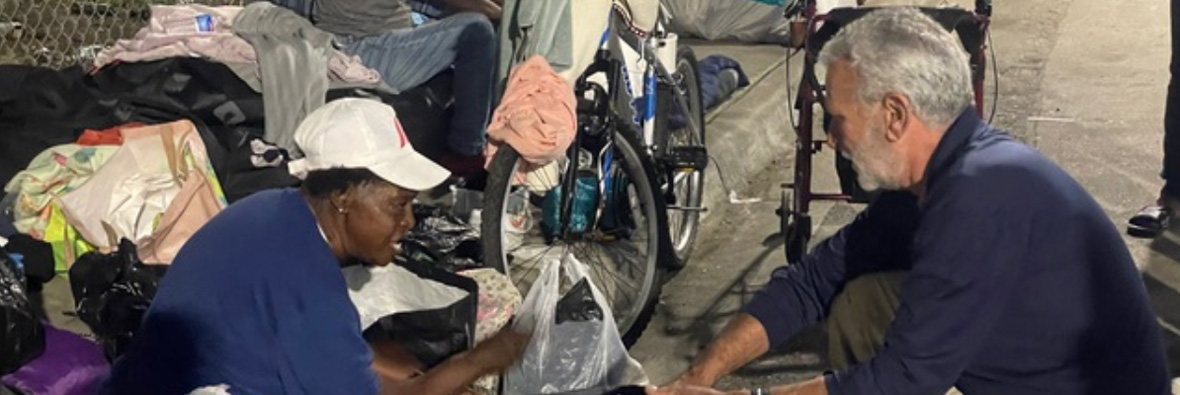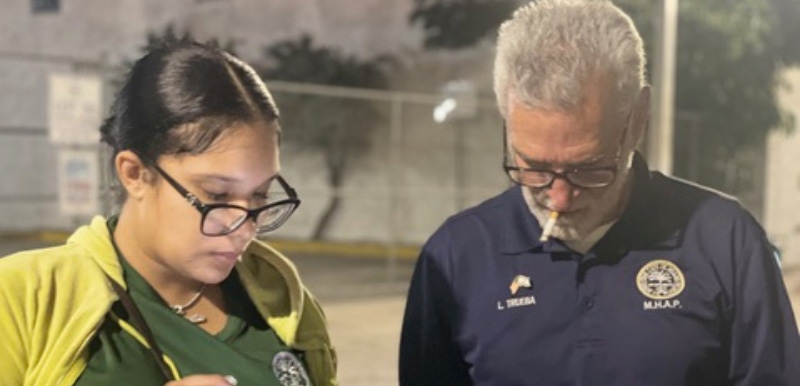For nearly 30 years, Lazaro Trueba’s office has been on the streets. His work space was the underpasses, back alleys, intersections, and bus stops of Miami-Dade. This career public servant has devoted much of his adult life to helping people experiencing homelessness.
Despite shying away from the spotlight, South Florida’s national and local news stations, including CNN, have managed to catch a glimpse of this unsung hero at work. Now, after nearly thirty years of dedicated service, he is bidding farewell to his role as an assistant program administrator with the City of Miami's Homeless Assistance Program and retiring.
Lazaro's career highlight is the creation of The Lazarus Project, a transformative initiative that has touched the lives of countless individuals with severe mental illness and helped many come off the streets. Named in honor of Lazaro, the pilot project, which began nearly a decade ago, diagnoses, drafts a treatment plan, administers medications, and monitors the progress of unsheltered individuals, with the ultimate goal of permanently housing them. Lazaro pitched the idea to Miami Homes for All and the Homeless Trust after seeing individuals cycle in and out of crisis services without the proper support. The project has made a profound impact on the streets of the 305 and has been replicated by numerous continuums of care across the United States.
Lazaro has also been deeply involved in the biennial homeless counts that the Homeless Trust has conducted, organizing the teams of outreach workers, volunteers, and service providers enumerating unsheltered persons. Lazaro’s last county was in January of 2024, in which we saw a 2-percent reduction in unsheltered homelessness.
We pulled Lazaro away from his retirement planning just long enough to get him to reflect on nearly 30 years of service to Miami’s homeless. Here’s what he had to say:
What inspired you to develop the Lazarus project?
There was an old lady named Annabel. She used to sleep on Biscayne Boulevard. She was so aggressive towards everybody. A lot of the time, we were there with the police, who would take her to the hospital, and she would be discharged in the same situation. So, after that went on for a long time, I became friends with the doctor over at the hospital, and I asked, “Why do we keep bringing Annabel here? She's back to the street the same way. Nothing changes.” And at that time, I had no prior knowledge about psychiatry and medications.
What he explained is that it takes a while for prescribed psychotropic medications to take effect. Determined to help, I asked the doctor for Annabel's medication and committed to ensuring she took it daily. Alongside my partner, we visited her daily, building trust and rapport. Slowly but steadily, she began taking her medication regularly, and her functioning started to improve. After a couple of months, we were able to transition her into a shelter and reunite her with her family, who had been searching for her for years.
The fact that the program is called the Lazarus Project has nothing to do with your name, does it?
Well, the person who named it was a former CEO at Camillus House. At the initial meeting about the project, he was like, “We're doing it! And I'm going to name it after you, but it will be “Lazarus” because they [are a Catholic organization.] So, Lazaro worked really well, and Lazaro in English or Italian is Lazarus!”
Can you describe a particularly impactful experience you've had while working?
Again, for me, the most rewarding and impactful thing during my career has been the Lazarus Project. I pretty much dedicated my entire tenure here to trying to help the mentally ill because it really touches me. I think that if you're out there, you see them like I see them. Most homeless people, if you notice, congregate in large groups. They're usually in an encampment and there's several people together. But the severely mentally ill, when I go to those places, they always stay by themselves. Nobody interacts with them. Nobody talks to them. They are usually alone and by themselves. So, it's very sad. And it really touched me. And that's what got me to try to help. And that has really impacted me in this job.
What would you say that has changed in the past years of doing this type of outreach work?
The shelters used to have more capacity on a daily basis, and we were able to serve more of the people that wanted help, get them to shelter. Now we have like a long waiting list and people calling it could take weeks for somebody that wants help to get in there and it's all due to the lack of affordable housing. It’s hard for people that just recently became homeless, and you want to try to get them help as soon as possible so they are not spending a lot of time in the streets and getting worse. So, it's taking longer to get those people into the shelter.
(Note, if you have rental properties available, the Homeless Trust’s RentConnect program needs you!)
What would you say are some misconceptions that people have about homelessness in general?
People tend to generalize that most homeless people are drug addicts, and that they're out there because they want to be out there. Nowadays that is definitely not the case. Another trend that has developed is that we see a lot of elderly people. The people we work with are not all drug addicts and not mentally ill. It's just a situational kind of thing because of the income/housing gap.
What do you think compelled you to stay for so long?
I really enjoy helping people. Often, I run across people who I don't even remember and they say, “You helped me get off the street and now I'm working in an office in Brickell.” Ha! And it's very rewarding to be able to help people.
What do you want your legacy to be after you retire?
I would like to see the Lazarus Project continue, because I think it's a great thing and it provides a service that traditional street outreach or the police or any other department does not.
What are your plans now that you're going to retire?
I am moving out of Miami to Central Florida. My other passion is fishing. I have a boat with my friend in the Keys and we fish offshore. As I said, I'm moving to the middle of the state, but there are a lot of lakes. So, my new thing is going to be bass fishing. I will be spending much more time with my wife and our two dogs that I love.
Lazaro, farewell. You are irreplaceable and will be missed by many. If you’d like to share your thoughts with Lazaro about the impact he made on your life, you can email joyce@m.network and the notes will be compiled for him, and even shared on social media.




